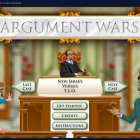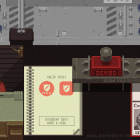By Tanner Higgin, Graphite
If there's one thing that games can teach really well, it's systems thinking. Getting good at a game like Portal, for instance, means learning its physics engine. When the game's over, it's only natural to draw comparisons between how things move, fall, and interact in the game and physical worlds. Similarly, building nations in Civilization exposes players to complex political, social and cultural relationships they can see reflected in global history. These examples are, admittedly, a bit old hat. Sure -- games can teach gravity or supply and demand, but can they show us how to build a good argument?
The following five games do just that by modeling the work of argumentation. Best of all, they approach the subject critically, showing the myriad uses for persuasion and how it's always political.
 1. Quandary
1. Quandary
Set on a colony somewhere out in space, Quandary tasks the player with settling disputes and solving problems by building sound arguments for one side or the other. Players tackle tough issues, sort fact from opinion, gather support, and try to make the best decision for the community even though there's no clear right or wrong answer.
 2. Citizen Science
2. Citizen Science
Good argumentation isn't just important to the humanities. Citizen Science demonstrates how effective persuasive skills help scientists better inform policy and make positive change in the world. Much like Quandary, players must gather, evaluate, and use evidence to sway public opinion to the best position.
 3. Argument Wars
3. Argument Wars
The stakes are high in Argument Wars. Players engage in debate-style combat over real Supreme Court cases. Like other games on this list, there's a healthy focus on argumentative structure and sound support, but players must align their arguments with the U.S. Constitution. After each case, players get to dig into the case's history, finding out how events actually played out.
 4. The Republia Times
4. The Republia Times
The Republia Times might be the most stripped down game on this list, but that doesn't mean it lacks punch. It only takes 10 minutes to play and has a super simple concept –- players play the role of an editor in charge of curating a newspaper's front page. Yet it does a fantastic job of communicating the political nature of any given system. And by focusing on editing rather than writing, players see how persuasion takes different forms.
 5. Papers, Please
5. Papers, Please
A follow-up of sorts to The Republia Times, Papers, Please puts players in the shoes of an immigration officer manning the border of a fictional communist country. To decide who is allowed in, players must build evidential arguments. They evaluate peoples' documents, question them, and try to find the evidence needed to justify denial or admittance. It's a stressful, grim experience full of heart wrenching decisions that show how ethics and morals are often at odds.

